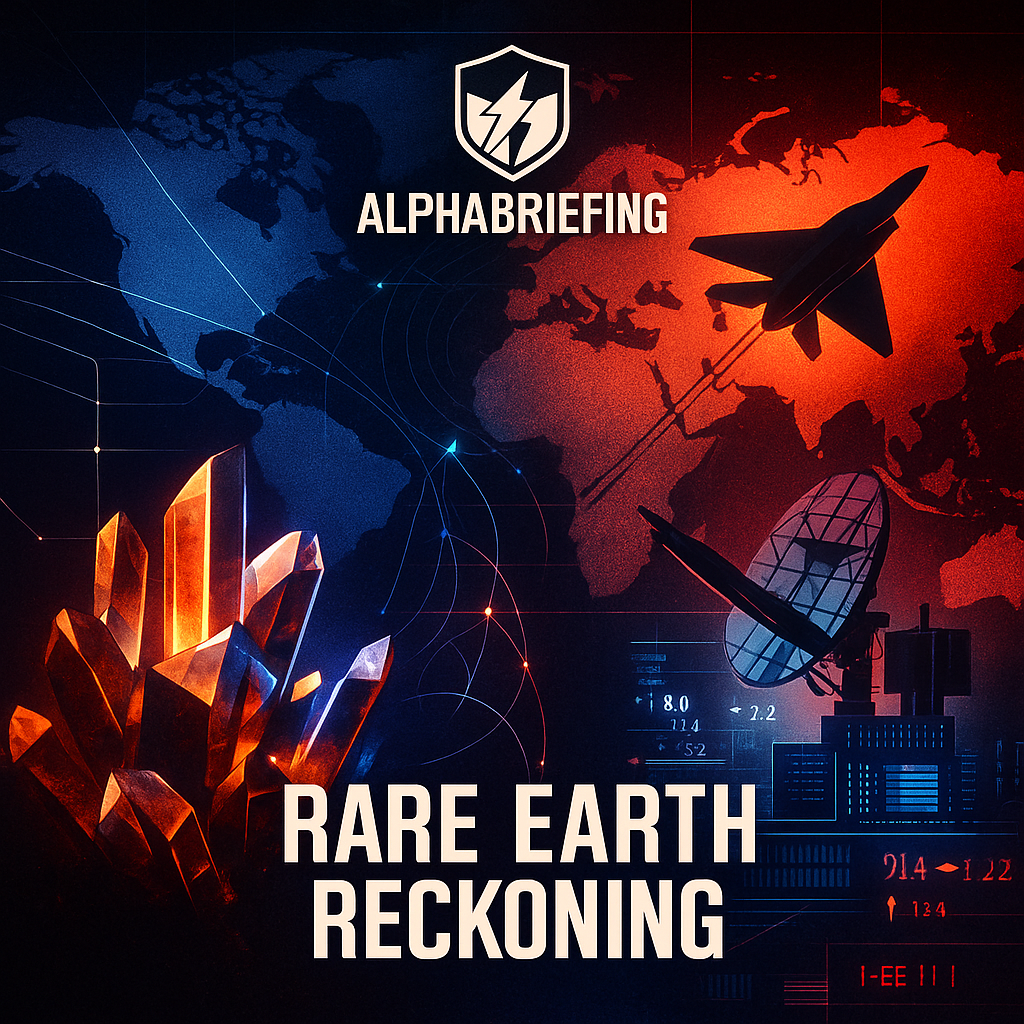🌍 Rare Earth Reckoning: China’s Silent Stranglehold — and the Stocks Poised to Benefit
China is weaponizing rare earths — the metals behind EVs, missiles, and chips. As Beijing tightens export controls, the West scrambles to respond. Who wins this strategic minerals war? AlphaBriefing breaks it down — and shows you how to trade it.

🎙️ AlphaBriefing Podcast – “Rare Earth Reckoning: Trump, China, and the Fight for Strategic Minerals”: For deeper insights on this topic, don’t miss our companion podcast episode. We explore how former President Trump’s trade moves and China’s critical minerals strategy are colliding, with expert analysis on what it means for global supply chains and security. 🎧 Listen on Spotify for the full story and additional perspective.
Listen on Spotify Now
The Hidden Heart of Modern Tech
Rare earth elements and other critical minerals are the invisible backbone of our high-tech world. From powerful magnets in electric vehicle (EV) motors and wind turbines to the laser guidance systems in missiles, these obscure metals make modern life and defense possible[1][2]. They’re in your smartphone speakers, your fiber-optic cables, and even the night-vision goggles used by soldiers. The catch? China quietly dominates the production and processing of most of these resources, giving Beijing enormous leverage over the future of technology and military power. As China’s former leader Deng Xiaoping presciently declared decades ago: “The Middle East has oil. China has rare earths.”[3]
This dominance didn’t happen overnight. Over the past 30 years, China methodically built a rare earth empire while other nations looked the other way. In the 1990s, Chinese firms partnered with Western companies to learn advanced mineral processing techniques, then moved the entire supply chain to China[4]. Beijing undercut global competitors with state-backed investments, lax environmental standards, and rock-bottom prices. Meanwhile, the United States and others, deeming rare earth mining a “difficult and dirty business,” were content to let China supply these critical materials cheaply[5]. The result? By 2023 China was mining about 70% of the world’s rare earths (and processing an even higher share) while the U.S. remained 100% import-dependent[6][7]. This near-monopoly means Beijing can tighten or loosen the tap on essential minerals at will – a “silent stranglehold” largely unnoticed by the public, but well understood in Washington.
From Dominance to Leverage: China’s Critical Minerals Play
Beijing is no longer shy about using its minerals might as a geopolitical weapon. In 2010, China abruptly cut off rare earth supplies to Japan during a territorial dispute, an unofficial embargo that served as a wake-up call to the world[8]. Fast forward to the current tech standoff: as the U.S. and allies curb China’s access to advanced semiconductors, China is firing back by squeezing the raw materials that make those chips (and much more) possible.
Over the last two years, a cascade of Chinese export restrictions has targeted these strategic minerals. In mid-2023, Beijing imposed strict export licensing on gallium and germanium – niche metals critical for semiconductors, infrared optics, and military sensors[9][10]. (China produces an astonishing 98% of the world’s gallium and the majority of germanium[11][12].) By December 2024, China had escalated to an outright ban on all gallium and germanium exports to the United States[13][14]. Around the same time, China moved against graphite – the material used in EV battery anodes. In October 2023 it began requiring special permits for high-grade graphite exports[15], a move that threatened to bottleneck EV production given China’s ~75% grip on global graphite supply[16].
The pressure peaked in 2025. After a newly elected U.S. administration hiked tariffs on Chinese goods to unprecedented levels, Beijing retaliated where it hurts: rare earth elements. In April 2025, China slapped export controls on seven essential rare earths – including dysprosium, terbium, samarium, lutetium, scandium, yttrium, and gadolinium – by forcing exporters to obtain government licenses[17]. These metals are linchpins for EV motors, high-temperature magnets in jet engines, and other high-tech applications. Then in October 2025, China unveiled its most sweeping restrictions in history, expanding licenses to cover 12 of the 17 rare earth elements[18]. Beijing even went a step further: for the first time it invoked an export control rule requiring licenses for any product worldwide that contains Chinese rare earths or was made using Chinese rare earth technology[19]. In other words, China asserted the right to reach across borders and regulate downstream products – a bold stroke mirroring the extraterritorial tactics the U.S. has used in its own chip export controls[19].
Each of these moves sent shockwaves through global supply chains. Manufacturers suddenly faced new hurdles and paperwork to secure materials that had always flowed freely from China. Prices for gallium and germanium spiked after the 2023 controls. And when the October 2025 rare earth curbs hit, Western markets reacted instantly: shares of U.S. rare earth producers soared (MP Materials jumped +36%, Energy Fuels +33%) on bets that non-Chinese sources would become more valuable[18]. Yet the broader reality set in quickly: America’s entire rare earth output is still less than 1% of China’s capacity, and building new mines and processing plants takes years[20]. In short, Beijing’s message was clear – it can weaponize supply chains on its own terms, and the world has limited short-term alternatives.
What’s at Stake: EVs, Chips, and Defense
Why does this esoteric resource battle matter? Because the “stranglehold” isn’t just over some obscure metals – it’s over the future of technology, green energy, and national defense.
- Electric Vehicles & Green Tech: Critical minerals are the DNA of the clean energy economy. Take EVs: their motors require powerful neodymium-iron-boron magnets, which rely on rare earths like neodymium, praseodymium, dysprosium. If China throttles these exports, the West’s EV makers could face crippling shortages or skyrocketing costs, jeopardizing climate goals. Graphite is another vulnerability – without sufficient battery-grade graphite (nearly all processed in China), EV battery production hits a wall[16][15]. Wind turbines, solar panels, and high-capacity batteries similarly depend on a steady supply of specialty materials largely controlled by China.
- Semiconductors & Electronics: Modern chips aren’t made from silicon alone. High-performance gallium arsenide and indium gallium nitride semiconductors are crucial for 5G networks, radar, and advanced optics – and gallium is their key ingredient. Germanium is indispensable for fiber-optic communication and thermal imaging sensors[10]. China’s squeeze on these inputs is a direct response to U.S. tech sanctions, and it puts the $500B semiconductor industry in a bind: nations can design the most advanced chips, but without certain mineral ingredients or components (often produced in China), production can stall. Even everyday electronics like smartphones and laptops rely on rare earth elements for miniaturized speakers, vibration motors, and LEDs[21][22]. A supply shock would ripple from Silicon Valley to consumer gadget shelves worldwide.
- Defense Systems: Perhaps the starkest risk is to military readiness. Advanced weapons are only as good as the materials inside them. America’s F-35 fighter jets, for example, use at least 417 kg of rare earth materials per plane (in sensors, electric systems, and actuators) – some of which currently come from Chinese sources. Precision-guided missiles, laser targeting pods, satellites, radar arrays, and night-vision goggles all depend on rare earths or specialty metals like germanium[23]. If Beijing were to cut off exports entirely, it could hobble U.S. defense production – a scenario Pentagon planners consider a nightmare. As one U.S. rare earth CEO put it, China could “economically weaponize” these materials any time[24], effectively grounding fighter jets or silencing missile guidance if it chose. Even short of an outright embargo, China could create shortages by hoarding supply for its own burgeoning industries (like its rapidly expanding EV and aerospace sectors)[22]. The supply pinch is already being felt: global shortages of certain rare earth magnet materials are projected to increase in coming years[25], highlighting how demand is outpacing non-Chinese supply. In sum, control of critical minerals has become a strategic chokepoint – one that straddles economic and national security in ways few consumers realize.
Bottom Line: Rare earths and critical minerals may sound “niche,” but they underpin everything from the energy transition to the balance of military power. And right now, one country – China – holds an outsized share of that power in its hands, setting up a high-stakes clash over who will control the building blocks of the 21st-century economy.
🎙️ AlphaBriefing Podcast – “Rare Earth Reckoning: Trump, China, and the Fight for Strategic Minerals”: For deeper insights on this topic, don’t miss our companion podcast episode. We explore how former President Trump’s trade moves and China’s critical minerals strategy are colliding, with expert analysis on what it means for global supply chains and security. 🎧 Listen on Spotify for the full story and additional perspective.
🚨 Want the Alpha?
You’ve seen the geopolitical storm — now it’s time to turn insight into strategy. Our premium section dives deep into the U.S. rare earth revival, lists the top companies set to benefit, and delivers actionable stock analysis.
👉 Upgrade to AlphaBriefing Premium to unlock full access — or if you’re already a subscriber, just keep reading. 👇
🔒 Premium AlphaBriefing Subscribers Only
